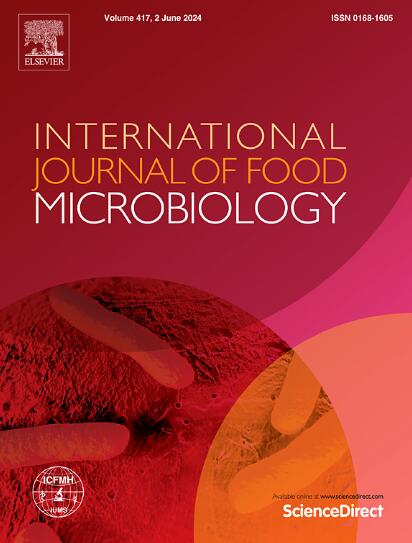Heat resistance of bacterial spores isolated from plant-based matrices: Consequences for food safety and quality
IF 5.2
1区 农林科学
Q1 FOOD SCIENCE & TECHNOLOGY
International journal of food microbiology
Pub Date : 2025-09-01
DOI:10.1016/j.ijfoodmicro.2025.111426
引用次数: 0
Abstract
Plant-based drinks are processed using methods like Ultra High Temperature treatment to guarantee their safety and quality by targeting heat resistant endospores of aerobic and anaerobic spore-formers. However, the spore heat resistance of bacterial isolates obtained from relatively new plant-based ingredients is yet to be determined. This study aims to benchmark the heat resistance of spores isolated from these ingredients to available inactivation data. D-values were collected from literature for spores of Bacillus cereus, B. subtilis, B. licheniformis, Geobacillus stearothermophilus, Paenibacillus spp., Clostridium spp., and other spore-forming species encountered in plant-based ingredients. Based on the temperature needed to reach a decimal reduction time (D-value) of 1 min, spores of G. stearothermophilus showed the highest heat resistance, followed by C. sporogenes, B. subtilis (high heat resistant subgroup), C. perfringens, Paenibacillus (high heat resistant subgroup), proteolytic C. botulinum, B. licheniformis, B. subtilis (low heat resistant subgroup), B. cereus, Paenibacillus (low heat resistant subgroup), and non-proteolytic C. botulinum. For a total of 96 strains isolated from plant-based ingredients, spores were heated for 30 min at 100 or 105 °C to screen for their heat resistances. For a selection of these isolates, in-depth heat inactivation experiments were carried out in phosphate buffered saline (pH 7.4) and the outcomes were benchmarked against the retrieved literature data. Experimental log10D-values of analyzed spores from plant-based ingredients fell within the 95 % prediction intervals of meta-analysis data, indicating that the overall spore heat resistance aligns with published data for similar species. This study supports the design of effective thermal processing strategies for plant-based dairy alternatives, which is essential for ensuring safety and stability of this growing and sustainable food category.
从植物基基质中分离的细菌孢子的耐热性:对食品安全和质量的影响
植物性饮料是针对好氧和厌氧孢子形成者的耐热内生孢子,采用超高温处理等方法来保证其安全性和质量。然而,从相对较新的植物性成分中获得的细菌分离株的孢子耐热性尚未确定。本研究旨在对从这些成分中分离出来的孢子的耐热性进行基准测试,以获得灭活数据。从文献中收集蜡样芽孢杆菌、枯草芽孢杆菌、地衣芽孢杆菌、嗜脂热地杆菌、Paenibacillus spp、Clostridium spp和其他在植物性成分中遇到的孢子形成物种的孢子d值。根据达到1 min的十进还原时间(d值)所需的温度,嗜脂嗜热G.的孢子表现出最高的耐热性,其次是芽孢杆菌、枯草芽孢杆菌(高耐热亚群)、产气荚膜芽孢杆菌、芽孢杆菌(高耐热亚群)、水解肉毒杆菌、地衣芽孢杆菌、枯草芽孢杆菌(低耐热亚群)、蜡样芽孢杆菌、芽孢杆菌(低耐热亚群)和非水解肉毒杆菌。从植物性成分中分离出96株菌株,将孢子在100或105℃下加热30 min,以筛选其耐热性。选取这些分离株,在磷酸盐缓冲盐水(pH 7.4)中进行深度热失活实验,并将结果与检索到的文献数据进行基准比对。分析的来自植物性成分的孢子的实验log10d值落在meta分析数据的95%预测区间内,表明孢子的总体耐热性与类似物种的已发表数据一致。本研究支持为植物性乳制品替代品设计有效的热加工策略,这对于确保这一不断增长和可持续的食品类别的安全性和稳定性至关重要。
本文章由计算机程序翻译,如有差异,请以英文原文为准。
求助全文
约1分钟内获得全文
求助全文
来源期刊
CiteScore
10.40
自引率
5.60%
发文量
322
审稿时长
65 days
期刊介绍:
The International Journal of Food Microbiology publishes papers dealing with all aspects of food microbiology. Articles must present information that is novel, has high impact and interest, and is of high scientific quality. They should provide scientific or technological advancement in the specific field of interest of the journal and enhance its strong international reputation. Preliminary or confirmatory results as well as contributions not strictly related to food microbiology will not be considered for publication.

 求助内容:
求助内容: 应助结果提醒方式:
应助结果提醒方式:


